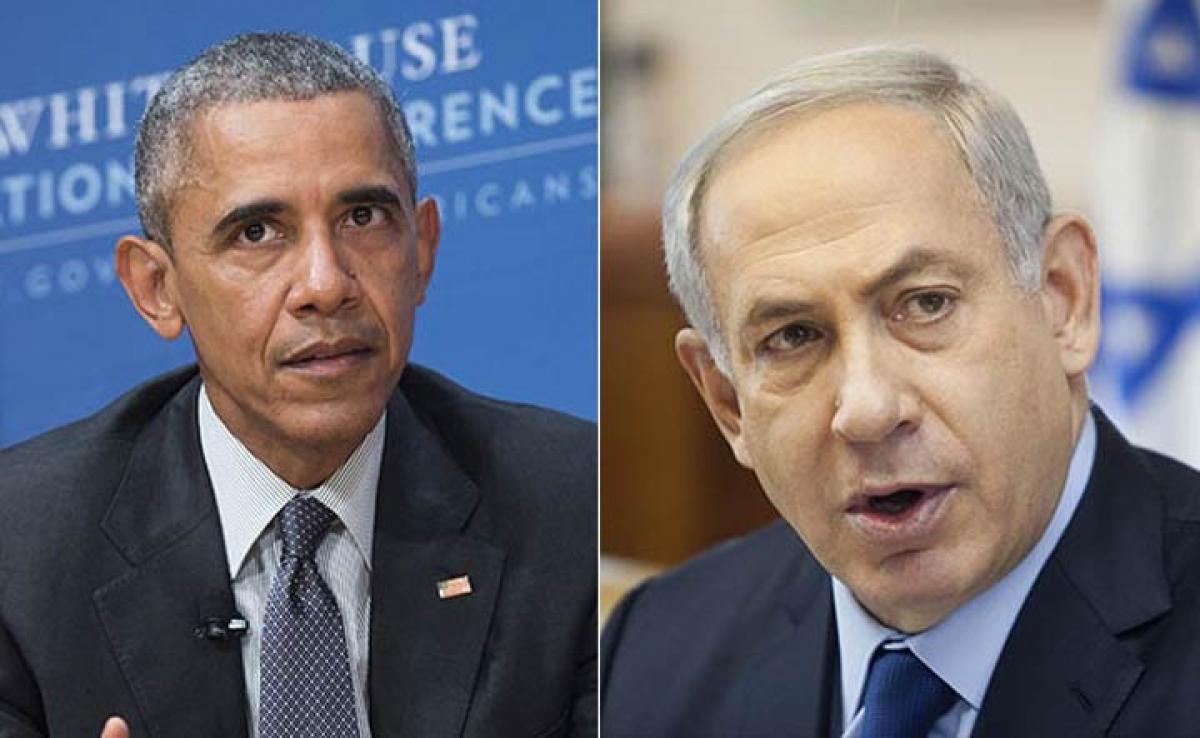Live
- GMR Airports Unveils AI-Powered Digital Twin Platform to Transform Airport Operations
- India poised to become leading maritime player: PM Modi
- Top Causes of Kidney Stones and How to Recognize Silent Symptoms
- India’s renewable energy capacity logs 14.2 pc growth at 213.7 GW
- Winter Session of Odisha Assembly adjourned sine die
- Biden calls Trump's tariff approach 'major mistake'
- After Drama Over Eknath Shinde’s Chief Minister Race, Maharashtra Cabinet Formation Faces New Tensions
- Egyptian FM, Blinken discuss recent developments in Syria
- Iran's supreme leader says Syria's developments result of US-Israeli 'plot'
- Elon Musk to Purchase $100 Million Luxury Mansion Next to Donald Trump's Mar-a-Lago, Report Reveals
Just In

x
Highlights
Israeli Prime Minister Benjamin Netanyahu and US President Barack Obama meet on Monday to put aside their rocky personal relationship and move past the Iran nuclear deal with multi-billon-dollar talks on defence.
Israeli Prime Minister Benjamin Netanyahu and US President Barack Obama meet on Monday to put aside their rocky personal relationship and move past the Iran nuclear deal with multi-billon-dollar talks on defence.
.jpg)
The two have not met since October 2014, and deep disagreement over the July accord between Iran and major world powers provoked bitter exchanges between the traditional allies both before and after it was reached.
Netanyahu has also faced pressure, including from the United States, to renew peace efforts after a wave of violence that began in October raised fears of a new Palestinian uprising.
Obama and Netanyahu are known to have testy personal ties, not least because of the right-wing Israeli premier's courting of Republicans -- the US president's opponents -- including in a speech to Congress in March not coordinated with the White House.
But analysts say the two seem determined to turn the page with a businesslike meeting and signal that the two countries' long-lasting alliance remains unshakeable.
"They will not fall in love with each other," said Zvi Rafiah, a longtime consultant on US affairs and former congressional specialist at Israel's Washington embassy.
However, "I'm sure (Netanyahu) understands exactly the value of this visit and the value of the United States".
The White House has sought to downplay personal feelings, with spokesman Josh Earnest saying they were "not nearly as important as their ability to work together to advance the national security interests of the two countries that they lead".
At the same time, more controversy erupted ahead of the trip over comments from Netanyahu's newly appointed media czar.
Defence Deal
After his appointment was announced on Wednesday, Israeli media dug up past comments from Ran Baratz accusing Obama of anti-semitism and saying US Secretary of State John Kerry's "mental age" was no older than 12.
Netanyahu condemned the statements and said he would meet Baratz after returning from Washington. Kerry spoke with Netanyahu about the comments that his State Department spokesman called "troubling and offensive".
The centrepiece of the meeting is expected to be a new 10-year defence deal, with reports that Israel will seek an increase in the more than $3 billion in US annual military aid it receives.
That aid is in addition to other assistance, such as spending on the Iron Dome missile defence system. Israel is also believed to be the only Middle Eastern country with atomic weapons, although it has never confirmed it.
The new defence spending would be aimed at assuaging Israel over the security risks it says it now faces because of the Iran agreement.
The deal with Tehran seeks to roll back its nuclear programme in exchange for a gradual lifting of sanctions. Netanyahu has called the accord a "stunning, historic mistake" that would not block its regional rival's path to nuclear weapons.
He has also argued that lifting sanctions will allow Iran to further back proxy militants, including Israeli enemies Hezbollah and Hamas.
The new 10-year defence deal will not be finalised during the Obama-Netanyahu summit, and would come into effect only after the current accord expires in 2017.
But the two leaders are expected to discuss commitments that could see Israel getting more than the 33 stealth F-35 fighters already ordered, precision munitions and a chance to buy V-22 Ospreys and other weapons systems.
Mixed Signals
The defence talks would provide both sides with an obvious way of demonstrating that the alliance remains solid, analysts said.
"The (Obama) administration is actually very keen to show that it is committed to Israel's defence," said Jonathan Rynhold of Israel's Begin-Sadat Centre for Strategic Studies.
"It's not just what Netanyahu wants."
Other likely topics include the Syria conflict and the recent Israeli-Palestinian violence.
Beginning in October, a wave of knife, gun and car-ramming attacks targeting Jews swept Israel and the Palestinian territories, along with violent protests, although unrest has waned in recent days.
Obama has previously criticised Netanyahu for sending mixed signals over his commitment to a two-state solution and may press him on the issue.
However, American officials say the president has lost any hope of a major peace accord being reached between the Israelis and Palestinians before he leaves office in January 2017.
Netanyahu arrives in Washington on Sunday and is expected back in Israel om Thursday.
Besides meeting Obama, he will receive an award from the rightwing American Enterprise Institute and is expected to meet members of Congress.
He will also speak to the left-leaning Centre for American Progress think tank in what some analysts see as an attempt to improve relations with Democrats.

Next Story
More Stories
ADVERTISEMENT
© 2024 Hyderabad Media House Limited/The Hans India. All rights reserved. Powered by hocalwire.com







